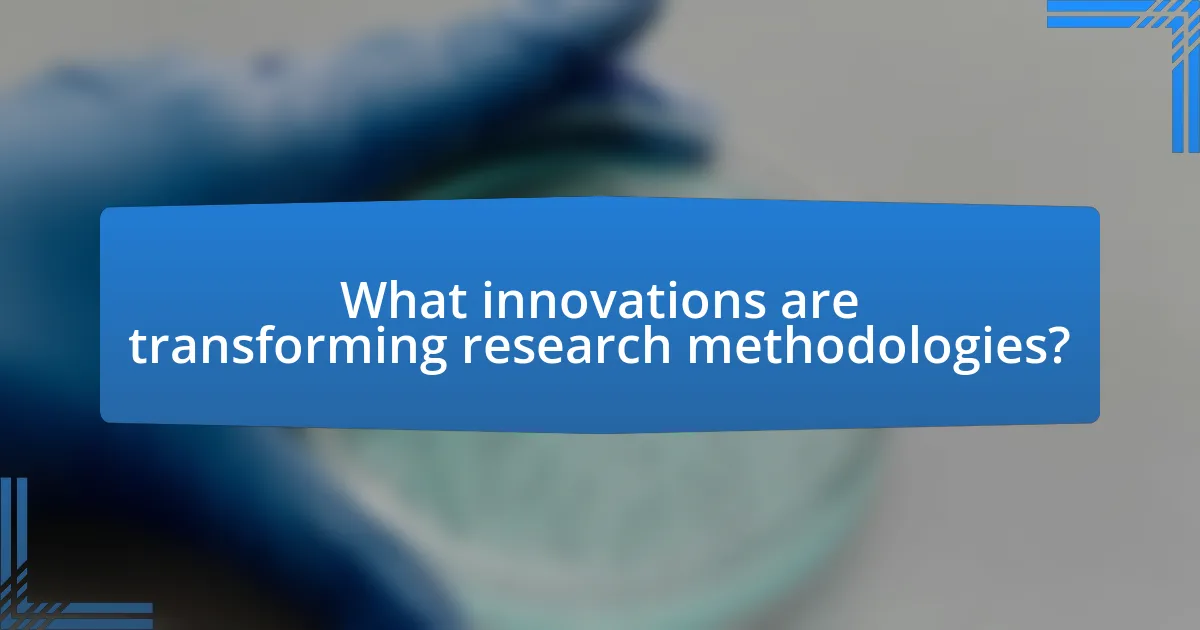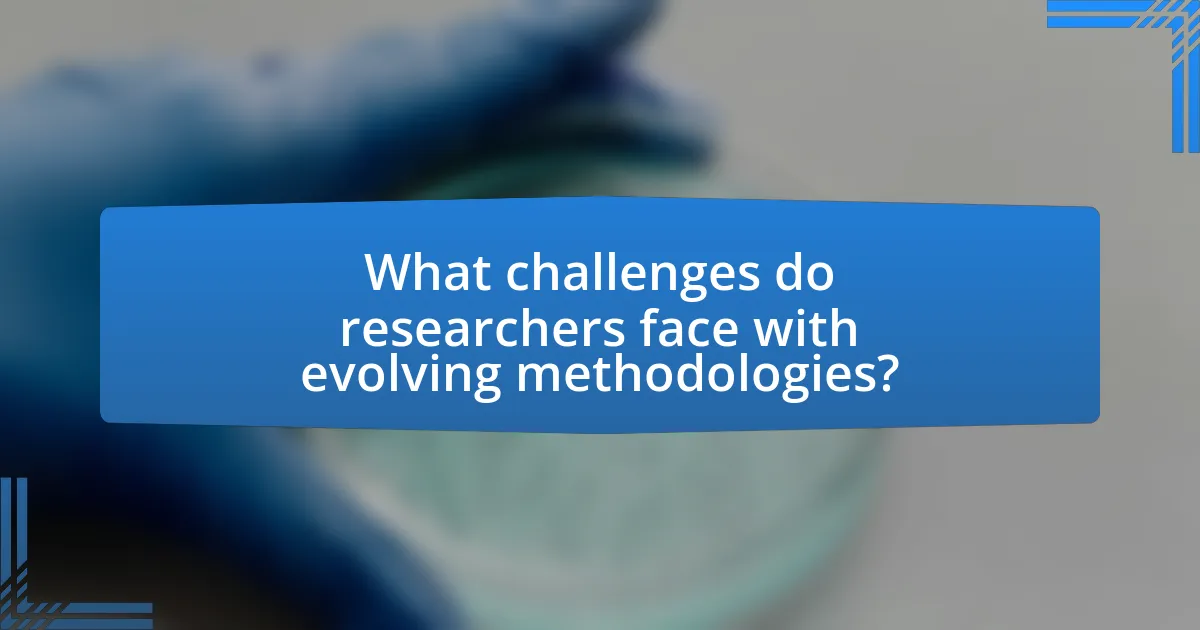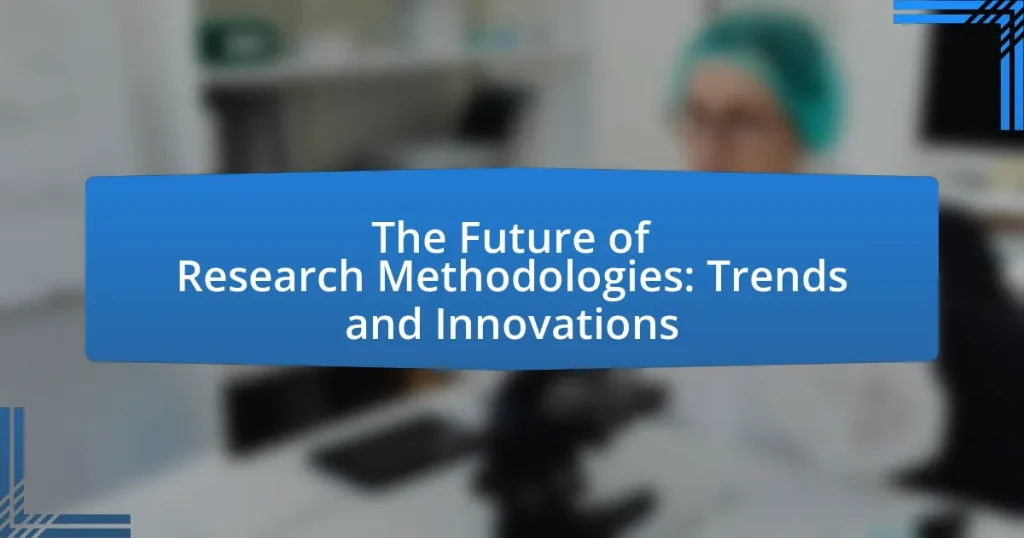The article “The Future of Research Methodologies: Trends and Innovations” examines the evolving landscape of research methodologies, highlighting key trends such as the increased use of mixed methods, the integration of artificial intelligence, and a focus on participatory research. It discusses how technological advancements, particularly in big data and collaborative platforms, are reshaping data collection and analysis processes. The article also addresses the implications of these shifts, including the importance of transparency, reproducibility, and ethical considerations in research practices. Additionally, it explores the challenges researchers face in adapting to new methodologies and offers strategies for overcoming resistance to change while ensuring methodological rigor.

What are the emerging trends in research methodologies?
Emerging trends in research methodologies include the increased use of mixed methods, the integration of artificial intelligence, and a focus on participatory research. Mixed methods combine qualitative and quantitative approaches, allowing for a more comprehensive understanding of research questions. The integration of artificial intelligence enhances data analysis and predictive modeling, streamlining research processes. Participatory research emphasizes collaboration with stakeholders, ensuring that research is relevant and impactful. These trends reflect a shift towards more inclusive, efficient, and data-driven research practices.
How are technological advancements shaping research methodologies?
Technological advancements are significantly shaping research methodologies by enhancing data collection, analysis, and collaboration processes. For instance, the integration of artificial intelligence and machine learning allows researchers to analyze vast datasets more efficiently, leading to quicker insights and more robust findings. A study published in the journal “Nature” by authors including David J. C. MacKay highlights how AI-driven tools can automate data processing, reducing human error and increasing reproducibility in research. Additionally, advancements in cloud computing facilitate real-time collaboration among researchers across the globe, enabling diverse teams to work together seamlessly on complex projects. This shift towards digital tools and platforms is transforming traditional methodologies, making research more accessible and efficient.
What role do artificial intelligence and machine learning play in research methodologies?
Artificial intelligence and machine learning significantly enhance research methodologies by enabling data analysis, pattern recognition, and predictive modeling. These technologies automate complex processes, allowing researchers to handle large datasets efficiently and derive insights that would be difficult to obtain through traditional methods. For instance, machine learning algorithms can identify trends and correlations in data that inform hypothesis generation and testing, thereby accelerating the research cycle. Additionally, AI-driven tools facilitate literature reviews and data collection, improving the comprehensiveness and accuracy of research findings. Studies, such as those published in the journal “Nature” by authors like Esteva et al. (2019), demonstrate how AI applications in medical research have led to improved diagnostic accuracy, showcasing the transformative impact of these technologies on research methodologies.
How is big data influencing the design of research methodologies?
Big data is significantly influencing the design of research methodologies by enabling more comprehensive data collection and analysis techniques. Researchers are increasingly utilizing large datasets to identify patterns and trends that were previously undetectable, leading to more robust and evidence-based conclusions. For instance, studies such as “Big Data in Health Research: A Systematic Review” published in the Journal of Medical Internet Research demonstrate how big data analytics can enhance the accuracy of health-related research methodologies by integrating diverse data sources, including electronic health records and social media. This integration allows for real-time insights and a more nuanced understanding of complex phenomena, thereby transforming traditional research approaches into more dynamic and iterative processes.
What shifts are occurring in qualitative and quantitative research approaches?
Shifts in qualitative and quantitative research approaches include an increasing integration of mixed methods, where researchers combine both qualitative and quantitative techniques to gain a more comprehensive understanding of complex phenomena. This trend is driven by the recognition that qualitative insights can enhance the interpretation of quantitative data, leading to richer findings. For instance, a study published in the “Journal of Mixed Methods Research” by Creswell and Plano Clark (2018) highlights how mixed methods can address research questions that require both statistical analysis and contextual understanding. Additionally, advancements in technology, such as data analytics and machine learning, are influencing quantitative research by enabling the analysis of larger datasets, while qualitative research is benefiting from digital tools that facilitate data collection and analysis, such as online surveys and text analysis software.
How are mixed methods becoming more prevalent in research methodologies?
Mixed methods are becoming more prevalent in research methodologies due to their ability to provide a comprehensive understanding of complex research questions. This approach combines qualitative and quantitative data, allowing researchers to triangulate findings and enhance the validity of their results. A study published in the “Journal of Mixed Methods Research” by Creswell and Plano Clark (2018) highlights that the integration of mixed methods has increased significantly, with over 50% of researchers reporting its use in various fields. This trend reflects a growing recognition of the limitations of single-method approaches and the need for more nuanced insights in addressing multifaceted issues.
What are the implications of shifting paradigms in research methodologies?
Shifting paradigms in research methodologies lead to significant implications for the way knowledge is generated and validated. These changes often result in the integration of interdisciplinary approaches, enhancing the robustness and applicability of research findings. For instance, the rise of mixed-methods research combines qualitative and quantitative techniques, allowing for a more comprehensive understanding of complex phenomena. This shift is supported by studies such as the one conducted by Creswell and Plano Clark, which highlights the effectiveness of mixed-methods in addressing multifaceted research questions. Additionally, the adoption of technology-driven methodologies, such as big data analytics and machine learning, transforms data collection and analysis, enabling researchers to uncover patterns and insights that traditional methods may overlook. Overall, these paradigm shifts foster innovation, improve research quality, and expand the scope of inquiry in various fields.

What innovations are transforming research methodologies?
Innovations transforming research methodologies include artificial intelligence, big data analytics, and collaborative online platforms. Artificial intelligence enhances data analysis by automating processes and identifying patterns that human researchers may overlook, as evidenced by studies showing AI’s ability to improve predictive accuracy in various fields. Big data analytics allows researchers to handle vast datasets, enabling more comprehensive insights and facilitating real-time analysis, which is crucial in fields like epidemiology and social sciences. Collaborative online platforms foster interdisciplinary research by connecting researchers globally, streamlining communication, and sharing resources, which has been shown to accelerate innovation and knowledge dissemination.
How is the integration of open science practices changing research methodologies?
The integration of open science practices is transforming research methodologies by promoting transparency, collaboration, and accessibility in the research process. Open science encourages researchers to share data, methods, and findings openly, which enhances reproducibility and allows for more robust validation of results. For instance, a study published in “Nature” by Nosek et al. (2015) highlighted that open practices lead to increased trust in research outcomes and facilitate collaborative efforts across disciplines. This shift towards openness is reshaping traditional methodologies by incorporating pre-registration of studies, open data sharing, and collaborative research networks, ultimately fostering a more inclusive and efficient scientific community.
What are the benefits of transparency and reproducibility in research methodologies?
Transparency and reproducibility in research methodologies enhance the credibility and reliability of scientific findings. By ensuring that research processes are open and accessible, transparency allows other researchers to verify results, fostering trust in the scientific community. Reproducibility, the ability to replicate study results under the same conditions, confirms the validity of findings and reduces the likelihood of false positives. Studies indicate that reproducibility issues affect a significant portion of published research, with estimates suggesting that around 50% of studies in fields like psychology and biomedical sciences cannot be replicated. This highlights the critical need for transparent practices, as they not only improve the quality of research but also facilitate collaboration and innovation by providing a clear framework for others to build upon.
How do collaborative research platforms enhance research methodologies?
Collaborative research platforms enhance research methodologies by facilitating real-time data sharing and interdisciplinary collaboration among researchers. These platforms enable diverse teams to work together, integrating various perspectives and expertise, which leads to more comprehensive and innovative research outcomes. For instance, studies have shown that collaborative efforts can increase the quality of research outputs, as evidenced by a report from the National Science Foundation indicating that interdisciplinary projects often yield higher citation rates and broader impact. By streamlining communication and providing tools for joint analysis, collaborative research platforms significantly improve the efficiency and effectiveness of research methodologies.
What new tools and technologies are being developed for research methodologies?
New tools and technologies being developed for research methodologies include artificial intelligence (AI) algorithms, machine learning platforms, and advanced data analytics software. These innovations enhance data collection, analysis, and interpretation, allowing researchers to process large datasets more efficiently. For instance, AI-driven tools like Natural Language Processing (NLP) enable automated content analysis, while machine learning algorithms can identify patterns and trends in complex data sets. Additionally, platforms such as Qualtrics and SurveyMonkey are integrating AI capabilities to improve survey design and respondent engagement, thereby increasing the reliability of research outcomes. These advancements are supported by studies indicating that AI can significantly reduce the time required for data analysis, leading to faster and more accurate research results.
How are data visualization tools impacting research methodologies?
Data visualization tools are significantly enhancing research methodologies by enabling clearer data interpretation and facilitating complex data analysis. These tools allow researchers to present large datasets visually, making patterns and trends more accessible and understandable. For instance, studies have shown that visual representations can improve comprehension by up to 80%, as they help in identifying correlations and anomalies that may not be evident in raw data. Furthermore, the integration of interactive visualizations fosters greater engagement and collaboration among researchers, leading to more robust findings and innovative approaches in various fields, including social sciences and healthcare.
What role do mobile and remote data collection tools play in modern research methodologies?
Mobile and remote data collection tools are essential in modern research methodologies as they enhance data accessibility, efficiency, and real-time analysis. These tools enable researchers to gather data from diverse geographical locations, facilitating participation from a broader demographic. For instance, a study published in the Journal of Medical Internet Research highlighted that mobile surveys increased response rates by 30% compared to traditional methods, demonstrating their effectiveness in reaching participants. Additionally, remote data collection allows for immediate data entry and analysis, reducing the time lag between data collection and results, which is crucial for timely decision-making in research.

What challenges do researchers face with evolving methodologies?
Researchers face significant challenges with evolving methodologies, primarily due to the rapid pace of technological advancements and the need for continuous adaptation. This evolution often leads to difficulties in maintaining methodological rigor, as researchers must balance innovation with established practices. For instance, the integration of artificial intelligence in research requires new skills and understanding of data ethics, which can overwhelm traditional researchers. Additionally, evolving methodologies may result in inconsistencies in data collection and analysis, complicating the reproducibility of studies. A study by the National Academy of Sciences highlights that 70% of researchers report challenges in adapting to new methodologies, indicating a widespread issue in the research community.
How do ethical considerations affect the adoption of new research methodologies?
Ethical considerations significantly influence the adoption of new research methodologies by ensuring that research practices prioritize the welfare of participants and the integrity of the research process. Researchers must navigate ethical guidelines, such as obtaining informed consent and ensuring confidentiality, which can limit the types of methodologies employed. For instance, methodologies that involve vulnerable populations or sensitive data require rigorous ethical scrutiny to prevent harm and exploitation. The Belmont Report, which outlines ethical principles and guidelines for research involving human subjects, emphasizes respect for persons, beneficence, and justice, thereby shaping the methodologies that researchers can ethically adopt. Consequently, adherence to these ethical standards can lead to the rejection of certain innovative methodologies that do not align with ethical norms, ultimately affecting the pace and direction of research advancements.
What are the potential risks associated with using AI in research methodologies?
The potential risks associated with using AI in research methodologies include data bias, lack of transparency, and ethical concerns. Data bias occurs when AI systems are trained on datasets that do not represent the population accurately, leading to skewed results. For instance, a study published in the journal “Nature” highlighted that AI algorithms used in healthcare often reflect existing biases in training data, which can result in unequal treatment recommendations. Lack of transparency refers to the difficulty in understanding how AI models arrive at their conclusions, which can hinder reproducibility and trust in research findings. Ethical concerns arise from the potential misuse of AI, such as invasion of privacy or manipulation of data, which can compromise the integrity of research. These risks necessitate careful consideration and mitigation strategies when integrating AI into research methodologies.
How can researchers ensure ethical compliance in innovative methodologies?
Researchers can ensure ethical compliance in innovative methodologies by adhering to established ethical guidelines and frameworks, such as the Belmont Report, which emphasizes respect for persons, beneficence, and justice. These principles guide researchers in obtaining informed consent, minimizing harm, and ensuring equitable selection of subjects. Additionally, researchers should engage in continuous ethical training and seek institutional review board (IRB) approval for their methodologies, which provides an external check on ethical considerations. Evidence shows that adherence to these practices significantly reduces ethical violations in research, as demonstrated by studies indicating that IRB-reviewed projects have lower instances of ethical breaches compared to those that do not undergo such scrutiny.
What barriers exist in transitioning to new research methodologies?
Barriers in transitioning to new research methodologies include resistance to change, lack of training, and insufficient funding. Resistance to change often stems from established practices and comfort with traditional methods, which can hinder the adoption of innovative approaches. Lack of training prevents researchers from effectively utilizing new methodologies, as they may not possess the necessary skills or knowledge. Insufficient funding can limit access to resources required for implementing new methodologies, as financial constraints often dictate research capabilities. These barriers collectively impede the advancement of research practices and the integration of innovative methodologies.
How can researchers overcome resistance to change in research practices?
Researchers can overcome resistance to change in research practices by actively engaging stakeholders through education and collaboration. By providing training sessions that highlight the benefits of new methodologies, researchers can address concerns and demonstrate the value of adopting innovative practices. Evidence shows that when researchers involve their peers in the decision-making process and offer support during transitions, acceptance rates increase significantly. For instance, a study published in the Journal of Research Practice found that collaborative workshops led to a 40% increase in the adoption of new research techniques among participants.
What strategies can be employed to facilitate training in new methodologies?
To facilitate training in new methodologies, organizations can implement a combination of hands-on workshops, online courses, and mentorship programs. Hands-on workshops allow participants to engage directly with new methodologies, fostering practical understanding and skill development. Online courses provide flexible learning opportunities, enabling individuals to study at their own pace while accessing a wide range of resources. Mentorship programs pair less experienced individuals with seasoned professionals, promoting knowledge transfer and personalized guidance. Research indicates that active learning strategies, such as those employed in workshops, significantly enhance retention and application of new skills (Freeman et al., 2014, Proceedings of the National Academy of Sciences).
What best practices should researchers follow when adopting new methodologies?
Researchers should conduct thorough literature reviews and pilot studies when adopting new methodologies. A comprehensive literature review ensures that researchers understand existing methodologies and their applications, while pilot studies allow for testing the feasibility and effectiveness of the new approach in a controlled setting. For instance, a study published in the Journal of Research Practice emphasizes the importance of iterative testing and refinement in methodology adoption, highlighting that researchers who engage in these practices are more likely to achieve reliable and valid results.
How can researchers effectively evaluate the suitability of new methodologies for their studies?
Researchers can effectively evaluate the suitability of new methodologies for their studies by conducting a systematic review of existing literature and assessing the methodologies’ alignment with their research objectives. This process involves analyzing previous studies that have employed similar methodologies to determine their effectiveness, reliability, and validity in addressing specific research questions. For instance, a meta-analysis can provide quantitative evidence on the performance of various methodologies, highlighting their strengths and weaknesses in different contexts. Additionally, researchers should consider the feasibility of implementing these methodologies, including resource availability and ethical implications, to ensure they are practical for their specific study.
What resources are available for researchers to stay updated on methodological innovations?
Researchers can stay updated on methodological innovations through academic journals, conferences, online courses, and professional networks. Academic journals such as “Research Methodology” and “Journal of Mixed Methods Research” publish peer-reviewed articles on the latest methods. Conferences like the American Educational Research Association (AERA) Annual Meeting provide platforms for sharing cutting-edge research and methodologies. Online platforms such as Coursera and edX offer courses on advanced research methods, while professional networks like the American Psychological Association (APA) facilitate discussions and resources among researchers. These resources collectively ensure that researchers remain informed about the latest trends and innovations in research methodologies.


